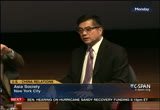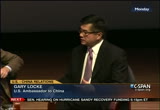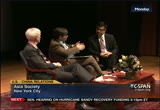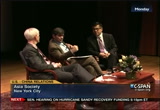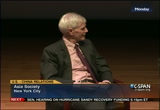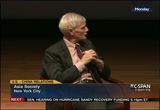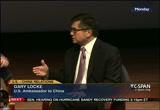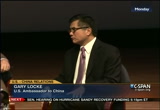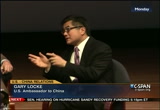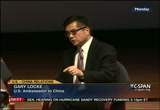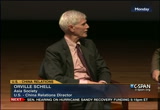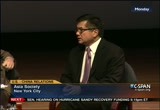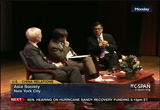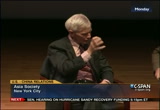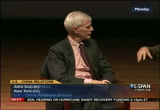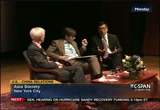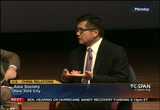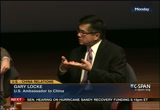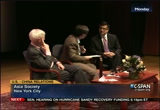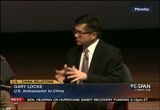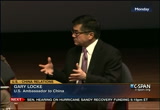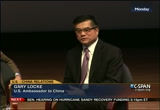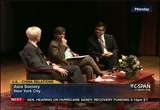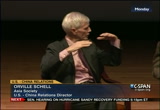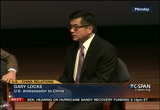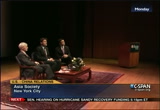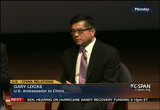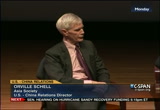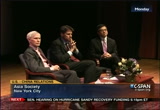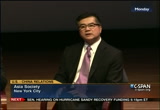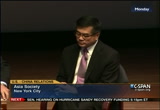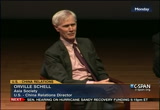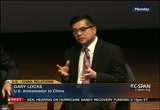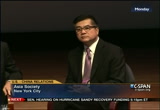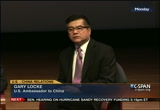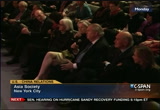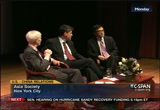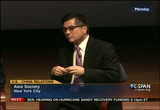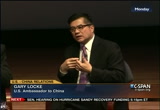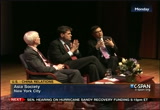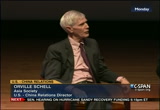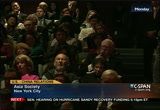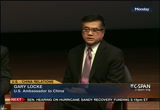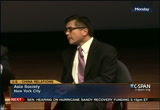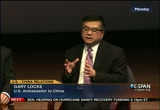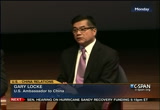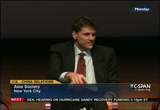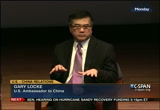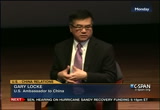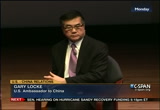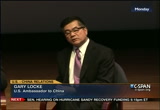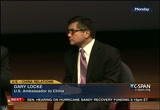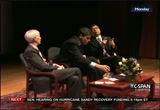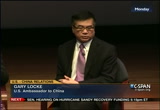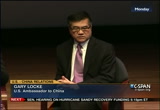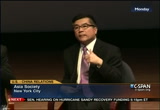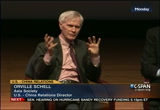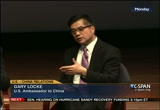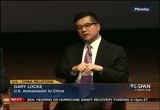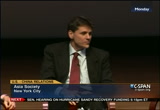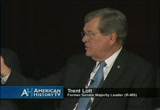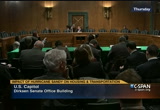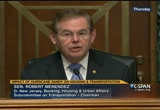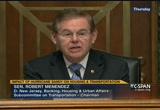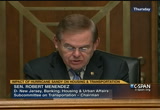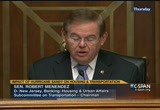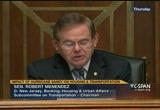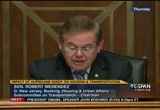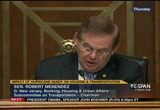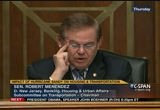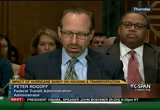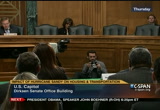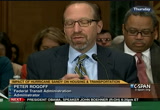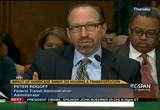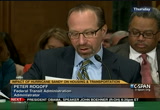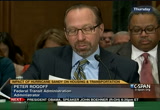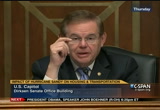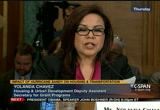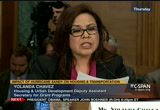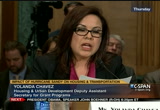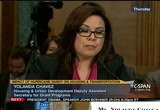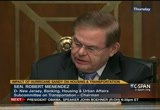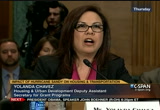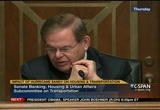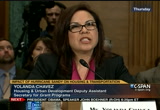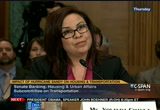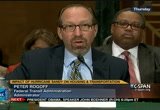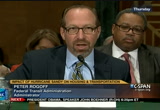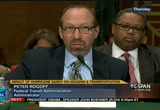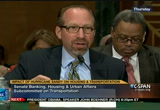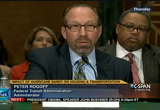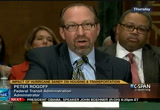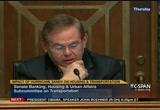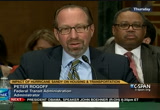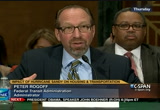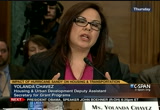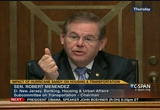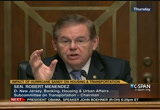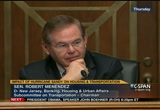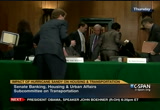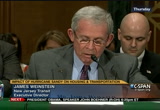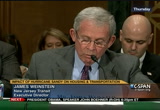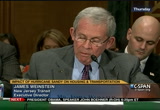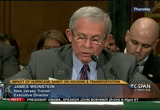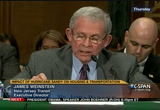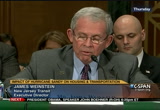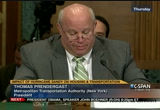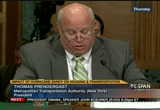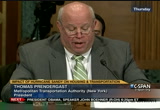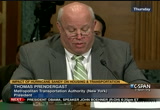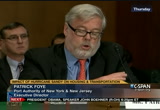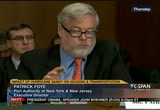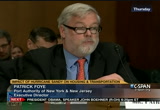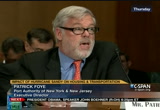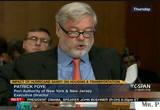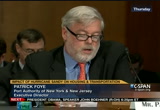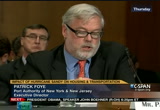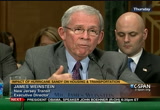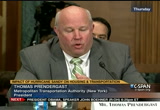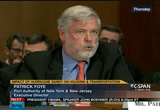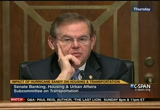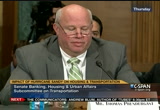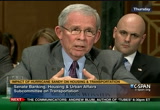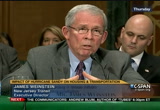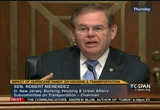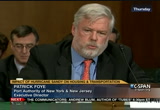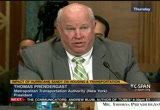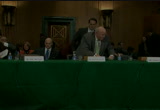tv News Politics and Public Affairs CSPAN December 22, 2012 4:14pm-6:30pm EST
4:14 pm
we're really engaging diplomatically with china and other members of united nations security council on tougher resolutions and possibly sanctions. >> making any progress? >> you have to talk to the ambassadors in new york and the sea to figure out what is going on. -- d.c. to figure out what is going on. >> in beijing, what is the view among the leaders you can tell of kim jong-u7n? -- kim jong-un? >> china would like all the parties that are part of this sixth party talks her to get back to the table, to see if we
4:15 pm
can encourage better behavior from north korea as opposed to imposing sanctions now and trying to coerce north korea into the fold. that is a difference of opinion of strategy. china really believes we ought to be engaged with north korea. united states feels every time we've tried to engage with north korea, they basically turnaround and failed to respond. >> what is the most important thing the chinese leaders want from you every day? >> the want greater cooperation with united states, because the understand how important united states is for their own economy.
4:16 pm
so much of what they sell and they produce is exported all around the world. they want the u.s. economy to be stronger as quickly as possible, because it means there will be able to continue to export. as much as they're trying to move from an export driven economy to a more domestic consumption based economy, they will still rely heavily on exports. the more americans are working, the more money they have in their pockets, the more they will be shopping in stores, and so much of what they buy is made from many other countries, including china. the healthier the u.s. economy is, the more that china will export. that means jobs for the chinese people. >> when you talk to leaders, how much are they actually were it about united states? -- worried about united states? >> i think united states is
4:17 pm
incredibly important to china, and recognize that. not only in very practical ways, but in another way, more psychological. there is a 150 year history were china has been trying to check itself up in big shin itself upr status. there is this lingering psychological mindset of china being victimized by the great powers. it is kind of a struggle between china's new confidence and success, and these old feelings, is why these visits to ensure rattled and a bit. -- asia rattle them a bit. >> way back at the beginning of
4:18 pm
notlast century -, japan only occupy it, but every other great power had pieces of it. >> is a struggle between a feeling of being a victim, and agents superiority. >> it is an absolute contradiction. two sides of the same mind. in the end, a new sense of chinese confidence and a sense of respect from the world will help cure this historical the element. -- dilemma. this is the reason that your job is so hard, because sometimes people -- things we think are straightforward --
4:19 pm
>> do you have a an example of that, something that was understood there as something you had to deal with and jump on? >> just for example, the dispute with japan on these islands, the chinese believe that the united states supports japan and puts japan up to the purchase of the islands simply because we have a treaty with japan. they believe that we therefore side with japan on the islands issue because we have a treaty that says we will come to the defense of japan. but we have defense treaties with many other countries. it does not mean that we agree with the actions of all of our
4:20 pm
allies. trying to make that differentiation has been very difficult. >> i was wondering what it was like for you personally. you became an instant celebrity in china. people saw you buying your own coffee at starbucks, carrying your own luggage, and they could not imagine -- what was that like? >> it was overwhelming at first. it went viral. the pictures of us in the u.s.a. -- we were not even in china -- somehow when the virus. -- went viral. you were instantly recognized. peddlers and merchants on the great wall, we were asked by everybody for pictures. it was overwhelming, but for a flattering. the chinese have been very warm
4:21 pm
and gracious. >> how much does it matter to them that your father was born in china? >> it is a source of great pride that i am a chinese-american. my ancestors are all from china. my wife's family is from china as well. >> in some way, they expect you to take the chinese side and all of the issues? [applause] [laughter] >> there was commentary over the internet, a look at this commerce secretary, he may be chinese on the inside, but he is white on the outside. a bill on the outside, white on the inside it. -- yellow on the outside, white on the inside. they called me a banana.
4:22 pm
[laughter] other said, he will not side with china. he will espouse u.s. policy 100%. i believe i have a slightly different perspective, that special perspective of history and culture, understanding my parents' immigrant background. i want to serve as a bridge between the u.s. and china. i believe that many of the problems we face in the world cannot be solved without the active collaboration of u.s. and china. and when the history books to say it was china and united states working together that solve these problems, instead of the history books and blaming the united states and china for failing to respond to things like climate change. having history books ignore the incredible contributions of china over thousands of years
4:23 pm
towards civilization, and just say, united states and china missed the opportunity and skirted up. -- screwed it up. >> we have two chinese immigrant families representing america. it is hard to imagine it in reverse from the chinese side. they're not an immigrant-based society. >> do they take it as an honor? >> yes. they also want to claim him. you know, as part of the greater china community. and then there is a bit of a disappointment, but it is an
4:24 pm
amazing moment in american history. >> i guess you want over there just before or after the big confrontation in august over the debt crisis. what has been their view of how our political system is working, whether we are worthy partner? >> the views of a top chinese government leaders is to have great confidence in the u.s. economy. they have made those statements to the top american leaders that have gone, all the way from vice president biden, and xi jinping
4:25 pm
met with president obama in february of last year. they expressed great confidence in united states. they're always asking about how the recovery is going. they believe that we will get our fiscal house in order. they know how dependent they are, and that is why they want a strong -- >> to the understand the internal struggle between the president and congress? >> i think they're starting to understand that more and more. the ambassadors to have our government officials about studied. united states -- they have are government officials who have studied in the united states. the congress does not necessarily speak for the president. >> he said something quite interesting. he said he could not understand
4:26 pm
why the u.s. government should have three branches, in effect three governments within a government because it was difficult to get stuff done. [laughter] he was right. that is for sure. [laughter] "the new york times" called the new leaders of china and meritocracy of mediocrity. -- a meritocracy of mediocrity. >> there is talk about the last 10 years being the lost decade, where nothing much happened. if you turn that around a little bit -- i admit, there are a lot of problems and many things were and salt. -- unsolved.
4:27 pm
it was a pretty amazing tenures nonetheless. there were instabilities -- ten yeayears nonetheless. there were instabilities. when you look at the actual record, it is not bad. they more than got through. it is undeniably true -- it is hard to understand china in any terms, but if you cannot maintain the two opposite things happening at once, it is really difficult to understand what is going on. >> where is that tension right now, as to talk about this new era -- you talk about this new era?
4:28 pm
>> for a long time, people have thought the political reform had to accompany economic reform. ultimately, i believe it will, but the question is when. when do they run out of rope, have been one side of their system reforming and one side in almost a state of stasis? when xi jinping is in office, can at this continuity continue? or can they get another decade out of this system? >> we believe in united states government the part of their success in being able to enact economic reform and to address the growing disparity between
4:29 pm
the have's and have-not's, there has to be reform of the financial services sector. this dependence on state owned or government owned businesses, -- less dependence on state owned or government-owned businesses. if their own entrepreneurs and inventors and scientists are to create an infant after putting a lot of hard earned money and time and sweat -- create and invent after putting a lot of hard earned money and time and sweat, they need to make sure that there ideas are not stolen either. rule of law, transparency, a neutral legal system -- how much time do you spend on piracy
4:30 pm
issues? -- system? >> how much time do you spend on piracy issues? >> a lot of time. the president was very clear the drive got to enforce the rules to insure fairness. china has benefited enormously from its secession from the wto. if we and united states are ever to have additional trade agreements with other countries, the american people and american congress have to believe that we will make sure that when we lower barriers and open our markets to companies from other countries, but those other countries will also do the same for america. that is why the president was very clear in the campaign.
4:31 pm
we're going to hold other countries feet to the fire to ensure a level playing field. >> do you think this is something that chinese leaders respond to? >> yes. the chinese leaders will try to give a push and see if you back up. and if you do, they will give you another push. they do respect strength. at some point you have to say, we cannot back up any more. on some of these trade issues, that is what has happened. of course the chinese do not like it. i think they do understand national interest and defending it. >> even more delicate is these human rights issues. take us behind the scenes.
4:32 pm
there was a miscommunication betwe. >> i cannot reveal everything. let me say a few things. when we brought him into the embassy, he had severe medical conditions that we had to attend to. it was on that basis that we brought him into the embassy. when he came into the embassy, he never wanted to go to united states. he wanted to stay in china. he wanted to be a freedom fighter. all of our discussions with the chinese are about how we could get him back into chinese society, with protections for him and his family. he had suffered great abuse in his village in the province. he wanted to be free of that village. that is what the discussions were all about. secretary clinton was about to come into town for the strategic
4:33 pm
and economic dialogue. we felt no pressure to resolve this case and get them out of the embassy before she arrived. we had to make sure that he felt comfortable with whatever terms and conditions under which you would leave the embassy. and if not, we're prepared to have him be our guest and reside at the embassy for many many years. at one. he did not agree to the conditions offered by the chinese government. he said no. at that point, we started turning around and focusing on him being a resident for quite some time. >> would that have been possible? >> would have been difficult, but he would not have been able to roam the grounds freely because many parts of it are off-limits, even to some of the workers. who would pay for his, for instance, communications?
4:34 pm
in the old days you had a telephone, may be a land line, and newspapers. but now you have got the internet. how would he be able to communicate with the outside world? those things were issues that we started investigating, and trying to develop policies over. fortuitously, the were able to arrange -- we were able to arrange for his exit out of the embassy on terms that he accepted. >> do you understand what was behind his change of heart? >> we give him lots of cell phones. [laughter] within minutes after he walked out of the embassy, he was calling everybody in talking to so many people. as he later indicated and his wife later indicated, he was bombarded by advice and comments for many people. that may have led to his change of heart.
4:35 pm
>> i have to say that that negotiation was one of the most successful resolutions to a very difficult problem. both sides of leaned into it in a very pragmatic way. there was a little rhetoric, but not a lot of rhetoric. neither side scored points against the other. it worked out. it was a tough issue. >> no harm, no foul at the end? >> it was painful for china, difficult for the united states, yet they came to a conclusion and a practical way. >> is there any sense there that perhaps the united states and many around the world have stopped pressuring on human rights, political reform issues?
4:36 pm
>> i think that hillary clinton did not think that we should hold other issues hostage to the human rights issue. we had many issues to work out in china. i think there was a certain wisdom to that. i think the american government has pressed pretty hard, but we of learn to do it in a way that does not feel quite so insulting to china. the loss of face is not so great. gone are the days when a president goes to china and before that, they are pressured to released dissidents. -- release dissidents.
4:37 pm
each side did have to work it out. they did it in a pragmatic way. >> it was a very successful negotiation. originally we were able to get him out on terms that he felt comfortable with. free room and board at a college or university of his choice, pursuing legal studies, with a better lifestyle and the ever had in the village. altman and he had a change of heart and went to come to the united states -- ultimately he had a change of heart and wanted to come to the united states. he is now here, and his family is doing very well. on the issue of human rights, but we have made a top priority. we meet with lawyer groups,
4:38 pm
human-rights groups within china, legal groups, ethnic minorities constantly. we raise these issues with the chinese government at every point, publicly and privately. we have grown more sophisticated and how we approach human rights issues. we still approached them. >> i am going to excuse myself. [applause] >> thank you. >> nothing like following george stephanopoulos. if you raise your hands, they're people with microphones will find you for your questions. have been filtering through questions of up-and-coming in from our web site. there are an awful lot of them. you touched on the pacific islands problem.
4:39 pm
i am amalgamating a bunch of problems here. how worried are you about a flare-up? we saw the chinese incursion into japanese air space last week. what if any leverage do you have become, what kinds of messages are you sending by way of warning shots? >> the state department has been very clear from washington, d.c. that we need both sides, all sides to remain calm to avoid escalating. when you have escalation, and intended mishap can occur. -- unintended mishap can occur. it is imperative that all sides
4:40 pm
try to resolve these issues among themselves in a calm, deliberate fashion to avoid escalation or provocative acts. >> use the example on the economic front, the chinese like to push and see how for the can push. is that what is going on now in this front? >> i do. what is worrisome about these islands is, it is one question when you have a trade dispute. it is another when you have something involving sovereignty. the chinese have this idea of core interest. core interest means hong kong, taiwan, tibet, and now these islands. you remove a certain amount of flexibility when you say
4:41 pm
something is a core interest. it rose right into the brain of the sovereignty question. china is on compromising on that. -- uncompromising on that. >> question over here. >> in 2011, when secretary gates was visiting china for meetings, the chinese tested a new stealth plane that apparently was tested by the military without notification of the top civilian leadership. for the first time, we have not only china expanding with territorial, regional interest, we have china with a new political leadership with no military expertise. what impact do you think that will have in terms of potential miscalculations, and what have you already seen in the last 15 months in terms of civil and military relations?
4:42 pm
>> it is our hope that with xi jinping now heading of the militaup the military and come , being the president of china, but there will be greater coordination with the military. he has already reached out to the military within the last several weeks. >> anything on that point? question on the left here. >> ambassador, is there something in the history of china that precludes them from understanding our emphasis upon human-rights? >> the sometimes defined human- rights as the human condition. they look at the relative
4:43 pm
greater prosperity of the chinese people compared to 30, 40, or even 15 years ago as an indicator of their advancement and human rights. they're talking about things like poverty and medical care and things like that. oi sometimes think there is a bit of a disconnect. when we raise the issue of human rights, it will come back -- even in the newspaper articles, the will talk about, whether they're being criticized for human rights when the chinese people are much better off today years ago.were then years ag >> neither marxism nor leninism,
4:44 pm
have a tremendous amount of emphasis on individual rights. in confucianism, it is more so family plan. in marxism and leninism, the proletariat got the rights. everyone else had no rights. they are the enemy. in this sense, china does not have a lot of historical experience with implementing these questions. you begin to realize how much these are children of the french revolution and the british parliamentary system and the american revolution. that does not mean that it will not happen. it means that maybe there are preconditions in china, such as
4:45 pm
getting richer and more confident. >> with all the talk about more openness, that is all economic? >> nothing major. i would say it is a little early to draw such conclusions. >> does have to really wait and see -- you just have to really wait and see. xi jinping is the new party secretary, head of the military, and will be the new president come springtime. china is ruled by committee of seven. he may be the leader of that group of seven, but is got to develop a consensus and
4:46 pm
coalitions. how fast and how far they go, in certain areas, which areas they pick to focus on is yet to be seen. we really do not know. as orville was saying, we do not know the philosophies of all of the committee of seven and with it will come out on a variety of different issues. -- where they will come out on a variety of different issues. >> i think people are very hopeful, but we will have to wait. >> good evening. i have been hearing a lot of u.s. politicians as well as people like donald trump who accuses china as a currency manipulator. for me, i can recall recently
4:47 pm
where the u.n. was only worth 8.6 to $1. there is a 25% appreciation of the currency. i am just wondering, where does the u.n. have to go before people will hush up about the currency manipulator accusation. does the embassador have any idea? >> i cannot speak for the donald trump or others. [laughter] theretary geithner, expert on this matter, in the latest report did not label china in currency manipulator. we know the currency has more room to appreciate. we would like to appreciate more
4:48 pm
and faster. we also recognize that a lot has been done over the last several years. when you factor in inflation, it has changed significantly. i do not know how others will define it and at what point others will say it is sufficient. >> yes, sir, in the front. >> in the middle. >> over here. >> you were talking about tensions with the islands. what about north korea? how far do think the chinese will go in supporting north korea in terms of missile development and things of that nature? >> i do not know what your
4:49 pm
experience is in having off the record discussions with chinese diplomats, but my experience is that there is nothing but a deeper level of contempt for what has been going on in north korea. some people even saying they think the north koreans are crazy. but they do officially is another question. they're obviously not thrilled at the prospect of a reunified korea. this is an area where the chinese could tune themselves up a little bit better. clearly, they're not in love with north korea. the lease, not people who have dealt with it. not people who have dealt with it. >> china is trying to encourage the economic transformation of north korea and encouraging north korea to almost all the
4:50 pm
same path that china has engaged in the last several years. opening up their economy. china has been actively trying to establish free trade zones and encouraging other countries to establish operations in certain areas as a way to beef up the north korean economy, in hope that might lessen the isolation of north korea and hope that might influence their foreign policy and some of the military policies. >> on the upside there? >> what about china's continental border with russia. what about china buying into actuallyand actually, wa colonizing siberia?
4:51 pm
how does that worry the united states, china getting stronger on account of siberia and throw a have not heard on any proposal? >> i have not heard of any proposals of china buying into siberia. >> oh, investment. >> united states once a prosperous china that assumes greater responsibility and engagement from the world commensurate with its capabilities and economic power. we do not want china simply to grow and take a free ride or get a free ride on everything else
4:52 pm
that is happening around world. china needs to step up and take a responsible role in managing international affairs, whether it is conflict in africa, to the middle east, to north korea, and elsewhere. we're seeing some of that already. there's good cooperation on many issues, including afghanistan, engagement with china on issues of north korea. we may not always agree, and certainly china has cut back its purchase of iranian oil and is working with united nations and united states on trying to dissuade iran from developing a nuclear weapon. we very much welcome a prosperous, rising china. it is in our economic self- interest as well as the interest of the world and the asia- pacific region.
4:53 pm
we need to make sure that china -- we want to make sure that china assumes greater world responsibilities at the same time. >> the chinese have been seen in other parts of the world that but --they're investing, >> this engine of chinese entrepreneurialism has spilled over. russians are concerned, because it is the logical place for russian timber and minerals. that not china's fault russia does not have a
4:54 pm
colonization resistance to that sort of economic activity. >> i meant to call you before, sir. the recent article about how president obama had been educated about china and decided that he had to take a tougher stance vis-a-vis china. the article drew heavily on the national security council person responsible for china during president obama's first two or three years. was that posturing for the political campaign, or is it correct that president obama wants to have a a a more hard- nosed posture vis-a-vis china? what are doing about it? >> president obama believes that
4:55 pm
when we enter into agreements with other countries and there is negotiation and we lower barriers, and open our markets to companies from other countries, when we enter into those agreements, those countries have to reciprocate. the have to live up to their agreements, otherwise the american people, the american congress will ask, why should we enter into another trade agreement with another country if those other countries get the benefit of the bargain and we do not enforce our rights? that is why you are seeing under president obama more actions against china, taken to the wto, where we have basically prevailed and been successful. it is a recognition that we have to play by the rules. all countries have to play by the rules, and that is why we're able to use the mechanisms of the wto to resolve disputes. that does not mean we're not
4:56 pm
going to try to cooperate with china on many other fronts. we have many other engagements in terms of science and technology, clean energy, collaboration's by our center for disease control, trying to look at the various world health problems, the solutions to which benefit united states as well. we will always have disagreements. we have disagreements with canada on trade issues. we have disagreements with france and mexico and many other countries. there is a mechanism by which we can all go to neutral refereeing of those issues. the wto is one way that we can do that. [inaudible]
4:57 pm
>> i did not have a chance to read that article. am not familiar with everything that was mentioned in that article. two months before the election, there was this big tough-on- china -- >> the pivot was announced almost a year before that. what set of the discussion of the exhibit was the announcement -- pivot was the announcement of rotating 2000 marines throughout australia. i do not think china should be fearful of 2000 marines hit in australia. -- in australia.
4:58 pm
our engagement with other countries throughout the asia- pacific region will focus on more cultural, economic assistance as well as military collaboration. even with china itself, we're engaging more with china. this has been from the very beginning of the obama administration and is also part of the pivot. the pivot is not just focusing our attention on the other countries of the asia-pacific to the exclusion of china. it means all of the asia-pacific including china, which is why secretary clinton has been to china seven times. yet had defense secretaries gates and panetta -- we have had defense secretaries gates and panetta and many other cabinet officials go to china specifically. >> maybe the president and
4:59 pm
administration has urged its back in little more in the past year. -- arched its back a little more in the past year. that does not mean that they are not deeply interested in finding ways to collaborate. this may seem to be contradictory, but it does not need to be that way. >> any questions? any of the young people in the back? >> how do you define young? [laughter] >> no comment. [laughter] second row in the middle. >> ambassador locke, there has been optimism with the new
5:00 pm
leadership that there'll be a greater openness of the chinese markets to foreign interests. you're all looking forward to that. -- we're all looking for to that. can you talk about the pressures on the new leadership as well as within the new leadership team as far as opening markets? particularly in the financial leadership area, which has been a sore spot? >> we feel that the competition and products that american companies offer would be good for the chinese consumer. creating more products, lowering prices, and help china achieve its own goals of getting away from an export-driven economy to more domestic consumption. the various products, from
5:01 pm
retirement to two insurance -- to insurance, to even simple savings and investment opportunities, would mean the chinese do not have to have so much cash under the mattress. china right now is so much on a cash basis for everything. the more they can free up that cash and have it to use for medical emergencies and other necessities of life, means they will be able to consume more. that is part of the five-year plan and good for the world economy as well. but they are moving slowly. some have said their regulatory system is not ready to take on opening of financial services, whether it is allowing more foreign companies to come in and own more than 33% share of a
5:02 pm
company, or even to offer products that are unheard of right now in china, the they do not have the regulatory system to oversee that. but we are pushing. they have made some progress last year. the joint commission on commerce and trade begins tomorrow. we opened an economic dialogue this past spring. lowering tariffs. a lot of imported goods come into china, which therefore makes it more her affordable to the chinese -- more affordable to the chinese consumer. we're beginning to see this, but again, we of course would like more and faster. >> in the middle.
5:03 pm
>> from conversations with some of my colleagues at chinese universities, some of them are very sympathetic on the issue of human rights. whenever to bed comes up, it is a blind spot. that is my -- whenever tibet comes up, it is a blind spot. that is my opinion. in the spent months szechuan province, which has a very large tibetan population. i visited several monasteries there as well to get a sense of what is happening and to have conversations with some tibetan religious leaders. it is something we are very concerned about. we certainly find the escalating large number of self relations very deplorable. we raise this issue with the
5:04 pm
chinese government both publicly and privately. we very much believe that china should reexamine many of the policies that the religious and cultural identity of tibet. >> is there a direct statement of what the u.s. policy is or is not? >> u.s. policy has long not called for an independent tibet. we recognize tibet as a part of china. but within to bed, we believes there needs to be more recognition -- within to that, we believe there needs to be more recognition of the unique cultural aspects, religion, culture, language. >> would use the the little bit to the american attitude of the
5:05 pm
chinese -- would you speak a little bit about the american attitude toward chinese investment in the united states? >> if you're asking me about the american viewpoint, you all represent that. if you ask me about the american government viewpoint, the administration welcomes foreign investment from all countries into the united states, including from china. obviously, there are certain issues of national security that have to be looked at, whether the investment comes from france, and germany, israel or china. there is a committee on foreign investment in the united states. out of the hundreds of billions
5:06 pm
of dollars a year of direct investment coming into the united states involving thousands of transactions, only about 100 per year are reviewed by the united states government, and only about six or seven of those involved chinese companies. and out of the hundred that the united states reviews, only about 6%-7% are ever modified. so, the vast majority of investment coming into the united states is not problematic. we very much welcome that. in fact, we at the embassy just posted a huge ambassadors' forum on investment in to the united states, to which we had attending about 80 of the top chinese entrepreneurs and investors.
5:07 pm
we had about 24 different states making presentations and showcasing a whole list of different products and opportunities for investment in those states, from real estate to food processing plants, high- tech firms, biotech firms looking for investment and for capital. we very much welcome chinese investment, especially in factories that create jobs here in america. we have many examples of successful chinese companies, for example, one is opening a huge steel base in texas. a big automotive company has been in the united states for many years in the detroit area, employing thousands and thousands of american workers. that is the type of investment
5:08 pm
we very much encouraged. we have japanese auto makers building cars here in the united states, german companies with steel plants, russian companies with steel plants. we very much want that too. >> you cited a report that came out recently. during the whole campaign, all that china bashing, i do not think we heard a single u.s. official voice the support the you just did. maybe it was politically unpalatable. it stands to reason, everything you just said. >> president obama created a program called "select usa," that is specifically the first federal -- i am having a hard time spitting out my words because the jet lag is finally
5:09 pm
hitting me. it is the first federally coordinated effort at attracting foreign investment in the united states. we recognize that it creates jobs. whether it is the honda plant, the mercedes-benz plant, bmw, to even airbus down in alabama. they come here and set up factories and they are employing american workers. there is no reason why the chinese cannot to along with these other companies around the world. >> the united states, as the ambassador pointed out, is a very open economy. the chinese had some high- visibility cases that went awry. there is some uncertainty about just how receptive we are, but i think this is largely a
5:10 pm
political problem, not a problem caused by the review process in washington. i think it would be who've the united states to hang a shingle and solicit in a more aggressive way this investment because, like it or not, the developing world is coming together with the developed world. there is great american interests to be had by embracing it. >> our investment forum was really focusing on the benefits of coming to the united states to establish operations because any of the advantages that china has in terms of manufacturing are beginning to fade. when you manufacture in china and ship it to the largest consumer market, oil transportation costs are three times higher today than they were in the year 2000.
5:11 pm
the electricity costs in the united states are expected to drop dramatically in the next 10-15 years. if you manufacture and establish your operations in the united states, you get to take advantage of the many trade agreements the united states has with other countries. a foreign company that establishes operations in the united states and manufacturers in the united states, employing good, american workers, can therefore exports to the rest of the world and take advantage of the trade agreements that america has with other countries, including lower tariffs. there are many benefits to creating operations here in the united states and creating jobs for the people of america. in our investment forum, we're
5:12 pm
focusing on the benefits of investing in america, establishing manufacturing facilities in america, as well as dispelling some of the myths and stereotypes. the keys to successful investment in the united states is having the right set of advisers from accounting firms to pr firms and management consultant firms. >> i think we have to leave it there. thank you for coming. thank you, everyone. [applause] i was just going to thank you. it was a pleasure.
5:13 pm
[captioning performed by national captioning institute] [captions copyright national cable satellite corp. 2012] >> on "newsmakers," incoming congressman eliot engel on the house and senate reaction to the u.s. consulate in benghazi. he will also look at the report this week on how the state department handled the matter. "newsmakers," sunday at 10:00 a.m. and 6:00 p.m. eastern on c- span. >> when i first came to washington in 1968 as a staff member to a democrat, chairman of the rules committee, one of the things they would do on thursday nights is played jim running -- played gin rummy in the capital. my job was to pour the scotch. there was a camaraderie. john has made the point many times that if you have dinner with somebody and our friends with somebody, if you go out
5:14 pm
with their families, you're much less inclined to try to cut your throat politically. >> than jack kemp became the ranking member. we still have meals together and talk football. even though we disagree significantly on almost everything, we learn to like each other. he was not evil. i was not evil. the problem is that now you have people thinking the guy on the other side is pure evil and my job is to blow them up. >> a look of how a lack of capitol hill friendships have changed things for the worst on c-span 3. >> as president obama begins his second term in office, what is the most important issue to consider in 2013?
5:15 pm
>> if you are in grades 6-12, make a short video of your message to the president. >> you have a chance to win the grand prize of $5,000. there are $50,000 total in prizes. the deadline is february 8th. >> the hud secretary testified on capitol hill thursday on the impact of hurricane sandy on transportation and housing. congress is currently considering a $60 billion relief package. this is about an hour and 10 minutes.
5:16 pm
5:17 pm
to meeting our challenges. as you all know, asante's overwhelming -- sandy's overwhelming force cause damage on an unprecedented scale. unprecedented, but we expect extreme weather like this to become more common for our region. because we need to prepare for the next storm, it is not enough for us to simply discuss how to restore infrastructure to pre- storm conditions. in my view, now is the time to determine what actions we must take in order to build back the region in a way that makes us less vulnerable in future storms. the term we use in washington to describe this is mitigation. and do not think that word makes clear enough the critical task we are pursuing. this is about rebuilding in a stronger, smarter and better way.
5:18 pm
we should have learned lessons from the gulf after hurricane katrina. transit agencies lost buses in the storm. when they started speaking with fema about replacing those buses, fema said they had to buy used buses of roughly the same age. these agencies were put in the absurd position of scouring the country trying to find someone who would sell them old bosses. but with mitigation funding, we can pay for new buses to replace the old ones. this same principle applies to rail transit. should we put the station back together with the same exact vulnerability to flooding, or should we rebuild in a way that would prevent such extensive flood damage in the future. of course we should rebuild.
5:19 pm
for my friends who are fiscal hawks, it is fiscally responsible to ensure that we do not have repetitive loss, economic consequences, and human consequences. we can prevent hundreds of millions of dollars to future damages to our transit system. to understand the importance of rebuilding in a way that makes us more resilient, let me lay out some facts about the damage to the region. based on preliminary estimates, over 300,000 homes were damaged. over 20,000 were destroyed or made uninhabitable.
5:20 pm
the estimate in my state alone is up to $39 billion in damage. i have lived in new jersey my whole life, and i have never seen damage like we have now. a realtor live in ocean port for 10 years. when word of the storm came, she evacuate it with as many possessions as she could. it is still not clear if her home will be torn down or rebuilt and put on higher stilts, and she does not have the money to do it. the only ones that survived were the ones built on higher stilts, which is why we need resiliency. for now, she is living in fema housing until december.
5:21 pm
she does not know where she will be after that. she is depending on friends and family. she has a remarkably positive attitude despite it all, which is why new jersey will come back stronger than ever. but if we do not have a robust program, the funding for her to rebuild will not be there. i would like to share these images from union beach, new jersey, where homes, cars, and people's very lives were destroyed. sandy was one of the largest transportation disasters in history. new jersey transit suffer damage to all 12 of its rail lines.
5:22 pm
miles of track were washed out. hundreds of cars and locomotives were submerged, some suffering irreparable damage. the system that carries 77 million people between new jersey and manhattan each year was brought to a halt by the flooding. it reopened only yesterday. to help illustrate just how serious the flooding was, i would like to share this image from security cameras, showing corrosive see water flowing into the station. in new york, where public transit carries more than 8 million riders each day, the damage was unprecedented. sandy shutdown the entire mta system for only the second time in its 100 a year history. a subway tunnels were flooded.
5:23 pm
12 subway station suffered major damage or were destroyed entirely. again, i want to stress the importance of investing now so we do not have to pay again the next time this happens. were tracks need to be raised, we should raise them. where walls need to be reinforced, we should reinforce them. where electrical stations need to be protected and elevated, let's protect and elevate them. the one thing we do not want is to find ourselves back in this room when the next major event it's our region. there are no other members here at this point. i would like to ask our
5:24 pm
witnesses to keep their statements to five minutes. of course, your written statements can be longer and you can submit them. miss yolanda chaves is here to discuss how the community development block program can be used quickly and flexibly to provide relief. with that, let's get started. >> thank you. thank you for inviting me here today to discuss the obama administration's request for assistance. as you pointed out in your
5:25 pm
opening statement, hurricane sandy triggered the worst disaster in the history of the united states. on the tuesday morning following the storm, more than half the nation's daily transit riders were without service. in the days that followed, services in baltimore, philadelphia and washington came back online. still, more than one-third of the nation's transit riders were without service. we applaud the first responders in the region who were to gather to restore service as quickly as possible. the department of transportation has been proactively engaged throughout this event. we were in regular touch with leaders in the region.
5:26 pm
we worked with fema to prepare well over 200 buses. i personally got on the phone to secure donated buses from less impacted transit agencies, and we got on e-mail to find some desperately needed equipment, which we found in chicago. that said, there is still a great deal more to be done. we are seeking $60.4 billion in recovery. $11.7 billion, the majority portion, would directly support the effort to repair and
5:27 pm
replace transit infrastructure and make it more resilience. these funds would be part of the relief program. i want to thank you and this committee for your leadership just a few months ago. the administration requested and i testified for a under this new program. this a more -- the support of both committees was timely. the request reflects two major priorities. first-come no to repair and restore public transportation infrastructure in new york and
5:28 pm
new jersey, as well as connecticut and other places along the eastern seaboard. we are working to conduct damage assessments for both operating capital costs needed to rebuild and restore. early efforts should allow us to compensate transit agencies promptly once assistance is made available by congress. this is a first-time effort to get fda contractors and fema people working side by side to do cost evaluation quickly and in concert with one another. secondly, the administration is requesting $5.5 billion to make
5:29 pm
transit agencies more resilient. people cannot afford to endure the loss of life and property that occurs when catastrophic events repeat themselves over and over. the sums to save them can far outweigh the cost to repair them multiple times. indeed, regional cooperation will be critical to this effort. president obama, as you know this month established a hurricane sandy rebuilding task force under the leadership of hud secretary donovan. we went up to new york just last week to sit with the head of new jersey transit as well as the port authority to make sure that
5:30 pm
folks are working in a cooperative way. we have a process to address the most critical efforts. it is really quite possible that if not done correctly, one mitigation investment could worsen the potential damage on a neighboring transit assets. this really needs to be done in a coordinated fashion. we need to make sure that the impacts of hurricane sandy do not repeat themselves. i will submit this rest of my statement for the record. thank you. >> good morning. thank you for the opportunity to testify regarding recovery from
5:31 pm
superstore in sandy. in my role at hud, i am responsible for the community development program and the home program. the disaster recovery program is critical to helping communities recover from and rebuild after disasters like superstore in santee. this morning, i will discuss the impact on housing of superstore in santee. additional details on these points are provided in my written testimony. hurricane sandy and the nor'easter that followed have had massive and varied impacts from virginia to ryland. especially hard-hit were new york and new jersey, two of our
5:32 pm
nation's most critical economic engines. one of the major impacts was damage to homes and apartments and the displacement of individuals and families. more than one of your 50,000 housing units experienced substantial flooding as a result of sandy. this means that housing will be a a critical part of the recovery effort. we project that about half of the damaged homes in new jersey were occupied by a lower and middle-income households. in new york, new jersey and connecticut, more than 20% of homes were damaged. hud is already assisting affected state and local governments. immediately following the storm,
5:33 pm
we hosted a call to help grantees understand how existing resources may be used for response and recovery efforts. further, hud has issued a waiver to make it easier to receive funds for emergency needs. as you know, sandy recovery and rebuilding include $17 billion in disaster recovery. this allocation will provide the necessary resources to plan and implement long-term recovery in the region, while helping impact did -- infected communiques -- communities -- while helping communities.munich t mitigation efforts have been found to provide a $41 return on
5:34 pm
investment. allocation of $40 million allowed for the rebuilding of stronger and safer wastewater facilities the were able to operate without disruption despite serious storms and flooding. we offer important flexibility and effectiveness by allowing jurisdictions to sign long-term housing and infrastructure recovery programs based on specific needs. our experience also demonstrates the importance of early appropriations, so that it is clear that the funds will be available and planning efforts can include the full range of needs. major infrastructure investments take time, but stayed -- state and local governments are
5:35 pm
unlikely to move forward with these efforts without assurances that they have the support of the federal government. after katrina, much needed assistance was delayed. i should also note that the disaster recovery funds are not actually drawn from the treasury until shortly before actual payments are made, but the guarantee that these funds will be available if necessary to the project -- move the project forward. we urge you to pass this bill as soon as possible to give this community the support they need to recover and rebuild. thank you for the opportunity to testify. i would be pleased to answer any questions you may have. >> thank you both for your testimony. secretary chavez, you say that
5:36 pm
new york and new jersey combined employ 12.7 million workers, or 10% of the united states employment, and that they are an estimated 11% of gdp nationally. don't those figures make a compelling case that it is not just about building or rebuilding, but helping to rebuild the national economy? >> we agree with that. it is not only critical for the regional economy, but the recovering and rebuilding effort is critical to the national economy. if we cannot get businesses back to where they were pre-storm, i think we will see our economic
5:37 pm
recovery slowed down. >> you also mentioned some incredible data about how you determine to 500 neighborhoods have 20% of the neighborhood damaged and 175 of those neighborhoods are in new jersey alone. what is the impact of that type of damage to a neighborhood? in my own visit to new jersey, i have seen neighborhoods that are multi-generational in terms of their calling a part of the community, their neighborhood, their home. i had a conference a couple of days ago with a host of our mayors, and one told me he had lost 20% of his base. when you lose 20% of your base,
5:38 pm
that is a nightmare, because there is no way to make it up, except for shifting the responsibility for that communities costs to all the other ratepayers. and or dramatically cutting essential services like sanitation collection and other critical elements. what does that mean? >> you make the case for why government is important. in order to rebuild the base, what it means losing 20% of the base, not only in terms of the tax base and property values, but also in terms of neighborhood safety, is
5:39 pm
devastating to communities. that is why it is critical that we start this process as soon as we can, because this type of disaster could take 4-10 years of rebuilding. we have seen that in mississippi. in mississippi, we are still working with the state to provide assistance to homeowners. we cannot wait longer to start the process. >> is it fair to say that a delayed recovery is a failed recovery? >> a delayed recovery is a failed recovery. a recovery that does not allow communities to plan for their range of needs, understanding that it may take 5-10 years to recover, we would also say is a failed recovery. >> administrator, taking off from the comments about the regional economy in the context
5:40 pm
of the national economy, transportation is a critical element of getting people to work, to be part of the work force at their jobs, being able to move the economy. i think sometimes we think maybe in other parts of the country the transit is some type of luxury, but is it not essential to economic success? >> absolutely, and nowhere more than the new york and new jersey region. more than 20% of mass transit passengers are in those two states. many studies have shown that after housing, transportation is the second-largest draw on the families paycheck. in terms of availability and
5:41 pm
affordability, transportation is elemental to the overall economic health of an area. as you pointed out in your statement, we are talking about more than 10% of the nation's gdp just in that area. >> i know you have helped fema do damage assessments. do you think the region's transit system could possibly be rebuilt with less than one- third of the funds the administration and requested? >> know, in fact we took note of one of the amendments that has been introduced that would cut that request by more than 70%, specifically in transit emergency relief. that amount would not even cover the recovery estimates that we have, much less get to any of the necessary mitigation. >> that amount would not even
5:42 pm
cover the recovery. >> just the restoration and recovery costs, most of which takes the form of reimbursements to the agencies from which you will hear on your second panel. these costs have been laid out by the mta, port authority and transit. we are working diligently with people right now to validate those costs so we can expeditiously reimburse them so they can continue to turn out their service for the year. we have to remember that they still have to live within their own budget envelops. meanwhile, they have laid out a great deal of money just on restoration. they have depleted their stocks of equipment. in some cases, they are stealing equipment from one line to keep another up and running. it is not sustainable. >> is it possible that if congress does not respond
5:43 pm
adequately that they will have to resort to [indiscernible] >> i think that question would be well put to the next panel in terms of how they will make the dollars add up. i know the mta would have to run up additional debt until we can reimburse them. i think there is a risk of serious service degradation to the public if they cannot restore their system to keep it up and running. >> some of our colleagues seem to think that any attempt to rebuild our transit systems with an eye toward mitigation and making them stronger toward the future is a waste of money. what is your perspective? >> one thing that became clear after a look at all of the us -- of this, is we known now, and
5:44 pm
the operators on the ground have known for some time, that we have some of the most critical components to keep the systems up and running in some of the most vulnerable areas. the think what folks are saying when they say we should not make mitigation assessment is we should take taxpayer money and rebuild those critical components right back in the same vulnerable and vermin. we can do this smarter and cheaper over the long run if we can make adjustments to protect this from happening again. propulsion power, a signal systems, we know now that some of those critical elements, the absolutely critical to get a service up and running to 10% of the american economy, are in very vulnerable places. none of us, no homeowner who has ever had their basement flooded repeatedly, takes their best
5:45 pm
family heirlooms and stores them on the floor of the basement. we might buy some shelving and store them on the shelf. what those folks opposed to mitigation are saying is that we should store the family heirlooms on the floor and wait for the next flood to happen. with disaster elements, much of the cost is fema eligible, so the taxpayer is going to pay again. that is why we built mitigation funding into the budget in a strategic way. they're not going to be just dollar spread around without a plan. the whole notion of the meeting we had with secretary donovan and the transit players in new york is what is the most cost- benefit to the region looking at the entire transportation network, even the son island
5:46 pm
ferry. -- staten island ferry. >> in other words, it is more fiscally prudent to do the mitigation. >> absolutely. i know it seems trite, but i have a very large tree in front of my house. one branch fell and went through the windshield of one of my friends cars earlier this year. one branch fell and went through my car. we do not park under the tree anymore. we are smarter than that. >> i was pleased as the subcommittee chair working with senator johnson on emergency relief, how do you think this program can help our agency build better and faster? >> femsa will only reimburses
5:47 pm
transit agencies to their defeat in a will only be -- fema will only reimburse agencies to their pre-existing condition. this program allows us to restore the agency to the level that providesbedroo reliable service and is up to modern technology. it also authorizes payments to prevent future disasters, which is why the mitigation and investments are authorized under the program. the other benefit, i believe -- you know, that conversation that we had between fema and transit agencies after femsa took many wasted months -- after katrina
5:48 pm
and took many wasted months to figure out who owed who what. we have that infrastructure in place. we have staff and no the facilities. two of the most tragic elements of the disaster sandy, the south ferry station in lower manhattan and hoboken terminal are two facilities that the fda had already just put hundreds of millions of taxpayer dollars and and were -- sustained extraordinary damage. our staff knows those buildings. we know what went in them. we worked with the same staff rather than how fema staff come in and go into a relationship on rebuilding. we think there is a benefit to the taxpayer to have the fta still involved in that. we will save time and money
5:49 pm
because we do. >> finally, madam secretary, let me go back to a, you made -- comment you made about having the resources necessary to understand and rely upon so that a community or an individual or a business can make and inform -- make an informed decision, depending upon or relying upon that that decision will be funded at the end of the day. whether the consequences of not having the resources -- what are the consequences of not having the resources under which you would make those decisions? >> the recovery will take longer. as you wait longer, it becomes more expensive. that is why it is critical, and we have seen this time and again with our experiences in mississippi, louisiana, iowa,
5:50 pm
where, when communities understand the funding they have and are able to plan years down the line -- they take the data they have and are able to plan years down the line. that is critical to know what the resources are right up front. we're going to ask them to plan for recovery based on their unmet needs and based on the funding available to help the recovery. >> >> in the grants that have the greatest flexibility, for
5:51 pm
example, a small business, which is the backbone, the economic backbone, which i have visited street after street of small businesses that have been closed and are trying to make a decision, do i start my business again or to i not, based on trying to get a sense from the government as to will there will be any circumstances under which the grant will be considered. while many told me they appreciate a small business loan, that is just adding debt to a debt they already have. they to get it to start their business. they took out debt to survive the great recession. and now they are faced with disaster. >> that is a fair statement. in fact, with the flexibility to
5:52 pm
determine how to design that program, they could determine to provide grants to small businesses to get them restarted. in other situations where maybe the business is opened but needs additional assistance, they may decide it is best to provide a low interest loan. there are many options to help their businesses get back to working again. >> i hope our colleagues and staff are listening to this testimony because the reality is, some of the amendments on the floor that were offered are miserly, to say the least, at a moment of national imperative. they do not have the spirit of what america is all about. this is the united states of america. there is the reason we call
5:53 pm
ourselves the united states of america, because we respond collectively to the needs of our citizens, regardless of what part of the country they are from. i want to thank you both for your testimony. i appreciate it. i look forward to continuing to work with you. as you depart, let me call up and introduce our next panel. james feinstein is the executive director of the new jersey transit, the largest transit system in the nation. he has kept a cool head in a tumultuous time for the agency and will help us understand the challenges new jersey transit faces going forward. hans pendergast is the head of the mta, which suffered
5:54 pm
extensive damage during the storm. i am glad he is here to help us wrap our mind around with those challenges are. patrick is the head of path, which is open again, that has significant challenges. i would like to ask each of you to give us about five minutes of oral testimony. you're full statements will be included in the record. >> good morning. thank you for your leadership in helping us get our stayed through this difficult time, and thank you members of this committee for providing this opportunity to address you. new jersey transit is the second-largest transit agency in the nation. sandy hit as particularly hard. we took extraordinary steps to mitigate potential harm. nonetheless, the system suffered extraordinary damage to critical bridges, electrical substations and track systems.
5:55 pm
in addition, under governor christie's leadership, we worked with fema, the department of transportation, the federal transit administration, and other departments to immediately implement interim bus service, to continue to deliver essential public transportation to our region's transit riders. sandy has shown that to restore our rail system to its previous state would leave us vulnerable to the next storm. we must rebuild in a way that is more resistant to future storms. those steps will require additional resources. we have identified $1.2 billion in projects that would be eligible under emergency assistance. they would improve our ability to withstand storms of all kinds, not just super storms
5:56 pm
that mimic sandy. let me outline a few of these projects. more than 25% of our rail cars were damaged during sandy, most of them flooding at our primary maintenance and repair facility, which had never before flooded. to prevent a recurrence, the top priority is ensuring that we have sufficient storm-proof railyards to keep cars out of harm's way of floods and storm driven debris. we estimate it will cost about half a million dollars to construct new railyards and inspection facilities. this facility will provide a centrally located site for storage to be rapidly reinspected and put back into --
5:57 pm
storage for cars to be rapidly respected and put back into service. in addition, we would build an operations center above foreseeable flood levels. we would safeguard the most critical portions of the complex and insurer -- ensure fed parts, -- that parts, generators and other equipment can ride out the storm. the hoboken terminal as well as portions of another station were lost. we estimate it will cost about $125 million to restore and strengthen these and other key locations against storms. sandy also ruined an electrical substation along the coastline and in hudson county, and elsewhere, which are vital for supplying wires with power. we are seeking $275 million to
5:58 pm
construct new substations and to improve the coastlines resiliency by constructing sea walls, bridges, buildings sheeting to prevent washouts and raising the controls. rail systems were impacted heavily by floodwaters. repairing my real to make them more resilience will cost about -- repairing light rail to make it more resilience will cost about $25 million. we are seeking to restore and expand enhanced communications during disaster. real-time communications are vital, mr. chairman, whether our customers are at the station, on a train, on a bus, on the internet, or using a smartphone. this is not just a customer service issue. it is a safety issue. mr. chairman, we recognize there will be local requirements for the funding we are seeking and
5:59 pm
we are fully prepared to work with our local mp go to make whatever changes are needed to our existing capital program. we also are ready to expedite the process. i would note that these cost estimates are just that, estimates. they may well evolve over time. however, it is clear that the money invested in preventing future storm damage will limit future storm relief as well as ensure that our transit system has a better chance of avoiding interruptions that disrupt people's lives and undermine the economic vitality of our region. we appreciate the committee's interest and any assistance you, the congress, and the administration can provide. thank you and i will be happy to answer any questions.
6:00 pm
>> thank you for holding this hearing and inviting me to testify today. in the president of every day the mta moves millions reliably and safely on our buses, railroad. or tunnels carry tons of vehicles per year. they operate 24/7, 365 days a year. we are the lifeblood of the economy, the largest in the economy. about two months ago, our region came to a complete standstill in the aftermath of superstorm sandy. it is a disaster that brought
6:01 pm
our system to its knees. the mta shutdown over services. despite preparation, we saw damage at a level we have never experienced before. most of our customers are seeking service and the workers are seeing another reality. it is a fragile system that is vulnerable. the subway line was completely washed away. the subway tunnel between brooklyn and manhattan is operational and will in only do so tomorrow. we have drawn down about 80% of our replacement equipment. the signal switches and relays have experienced damage from the storm. we need immediate repair needs. billions of project needs to protect our system from flooding occurrences.
6:02 pm
we will repair it and build our system as quickly as possible. 8.5 million people are depending on it. we have spent hundreds of millions of dollars to restore power as quickly as possible. yesterday our board approved of $2.5 billion in bonds despite anticipation notes that will be used for rebuilding. we were not able to handle this incredible burden on our own. a federal commitment is needed to ensure we can rebuild and we can build back stronger. once a disaster relief approximation is signed into law, we will enter into new contracts. we will restore the rock way line and repair damaged equipment, damage plans and communication equipment.
6:03 pm
as a work to bring our system back to normal, you must make the necessary investments to protect the system from future storms. we must rebuild smarter. the manhattan subway station is a perfect example. it serves over 30,000 riders per day. it was completely distorted due to superstorm sandy. we need to restore it. it was completely filled with corrosive saltwater. the last thing we want to do is come to congress for another $600 million when the next a disaster hits, but we will if we have to. it is in the interest of the american taxpayers. the superstorm sandy demonstrate that when mta shuts down, the nation poses -- nation's largest economy shuts down.
6:04 pm
our needs are great. this is a national issue. it is a national need. we need the federal's government help to get back on the road of recovery and protect assets for the future. once again, c for holding this hearing and giving me the opportunity to talk today -- thank you for holding this hearing and giving me the opportunity to talk to date. -- today. >> thank you for holding this hearing on the greatest transit disaster to ever happen in hiour history. mr. chairman, i thank you for your service to the people of our region. i also want to thank you governor chris christie of new jersey. for those unfamiliar with our agencies, it is the most important multi-transportation
6:05 pm
network in the world. laguardia airports. the george washington bridge is the busiest crossing in the world. there is a tunnel that links new york and new jersey. the largest port complex on the east coast and the commuter rail system. about 77 million riders rely on it. he will tell you it is an indispensable part of their lives. -- they will tell you it is an indispensable part of their lives. it is an essential in a region that has $1.4 trillion in economic output. 11% of our nation owes the gdp. of all of the transportation
6:06 pm
facilities, those suffer the most in the superstorm sandy. we took every step we could to prepare for the storm. despite preparations, is critical link was completely devastated by the historic storm surge. flooding reached over 2 feet in lower manhattan. the storm surge reached and blasted through our passengers stations. add the path tunnels, which are ancient by today's mass transit standards. the path network is dense and closely contained with complex tunnels interlocking underneath the hudson. these tunnels contain rack up on rack of critical and decades- old signals, switches, and communications equipment that was damage with a roasted seawater during sandy.
6:07 pm
these waters damage the signals, switching communications, and other equipment lining the tracks. our stations experienced tsunami like conditions. one of our busiest tunnels in our system was inundated after floodwater crushed the enclosed allocator -- elevator shaft. it sent millions of tons of water pouring into the station. every wire circuit and glass infrastructure that existed below ground was damage, destroyed, or left in need of repair. many of the parts that sandy destroyed are no longer manufactured due to their age. it is like trying to find replacement parts for entire ds in themodel t- for 21st century. we have a reestablish service on
6:08 pm
33rd street in manhattan. on november 12, we brought that service in newark. we have continued around the clock recovery efforts. service for the world trade center and certain stations. since yesterday, i don't of the police for the inaugural run of restore service to 33rd street and the west side of manhattan. -- i joined the police for the inaugural run to restore service to 33rd street on the west side of manhattan. one of our workers risked his own life to jump into several feet of murky floodwaters to restore the pump by hand, thus preventing further flood damage. tom o'neil was just doing his job. it does that attitude and all of our employees. we could not have done that on our own.
6:09 pm
companies and factors from all over have helped. they work day and night and on the weekends to prepare 2 mouse are preparing special communication abels for our tunnels leading to the world trade center. they were personally involved in getting breakers from cta in chicago. with operating at less than full strength, the new jersey transit continues its own efforts to restore service. what it normally was a 45 minute ride home for many has now doubled in length or worse. commuters seek alternative paths of r ferry service. they have to rely on late-night buses to make their way home. we continue to rebuild close to
6:10 pm
our network. the port our authority will need the government's ehealth. simply put -- the government's help. simply put, we need the government's help. parts of our network are operating on so-called manual blocks and personal medications while radio signals are still under -- personal can indications while radio signals are still under repair. funds would go into truck work and communication systems. -- trail work and communication systems. it may total more than $7 million, much earlier than our preliminary estimates, which was $3 million. we need to protect our system from future storms so we do not find ourselves in the same situation a few years from now.
6:11 pm
this would include a project as elevating parts of the track and strengthening critical tunnels beneath the hudson river. these measures would come at significant costs. without them, the costs of the taxpayer would even greater. some of you know that the port authority received taxpayer money from neither new york or new jersey. we relied excessively on user fees and other fees. all revenue streams that have limitations. our needs are significant. finally, i urge congress to act as soon as possible in approving recovery funding for new york, new jersey, and the connecticut region. the costs that we fail to make an investment are unfathomable in terms of the costs of lost productivity, lost jobs, and a fractured deprecation.
6:12 pm
thank you, mr. chairman. >> thank you for that testimony. some of my colleagues think these numbers are inflated. and not necessary. what would you say to that? >> mr. chairman, we have been very sensitive to that very issue. these are estimates that are a work in progress. we keep saying that, but i will tell you from the new jersey transit standpoint, railroads are expensive. remove a quarter million to 3000 people. they aren't on the railroads and not on the roads. -- are on the railroads and not
6:13 pm
on the roads. this is a network. it is expensive to maintain it. it has a return to the economy and the quality of life in our region. >> can you turn your microphone on? >> the mta infrastructure is 750 billion dollars. the damage we sustained a significant. it is affecting our ability to provide service. i think mr. weinstein l.a. elaborated clearly. if you experience the gridlock in manhattan and the outer boroughs and impact at large, you would see the impacts on the community. the transportation network that these three agencies provide for the new york region is the lifeblood of that region is an understatement. that is the way i would respond to that. >> i heard your numbers and they
6:14 pm
went upward in the original estimate and not down. it is likely that all of your numbers will go upward and not downward at the end. >> mr. chairman, i think that is right. service is only restored to one of the stations yesterday. allow me to note three points. in accordance with the approach that governor cuomo in new york and governor christie have taken, they believe in accountability. we understand we will get countable to the federal government and the taxpayers for every dollar we receive. second point, the port authority has spent out-of-pocket about $200 million on october 29. those dollars are real. we are compared to demonstrate every dollar. third, none of our agencies are talking about a bridge to nowhere.
6:15 pm
we're talking about restoring tunnels and bridges and train stations, whether it is the mta for the new jersey station. it would serve tens of millions of passengers per year. the damage of the equipment which was installed 60 or 70 years ago -- we are prepared to demonstrate and be accountable for every dollar that we are provided with. >> tell me what would happen if -- i think you are all familiar with the supplemental -- what would happen if you get collectively less than one third of what is being offered? how is it going to affect you? >> in terms of what i stated in my testimony, the board approved the additional funding of one $5 billion.
6:16 pm
we will run those down. we are just getting one of the tunnel uses tomorrow. we have extensive signal damage. tens of thousands of people a day use that line. the rock we not been restored, that service. -- rockway has not been restored, that service. we are reaching the limits of our own ability to generate funds we can use for these kinds of repairs. we will be forced to put off critical repair needs that may result in other delays. what we saw happen in the other tubes. it would affect our ability to provide a safe and reliable service. >> if you had to jot down the two point 6 billion -- >> $2.5 billion. >> you would have to pay those
6:17 pm
off. >> we are increasing the service to be able to do that. >> you ultimately looking at the possibility of -- >> yes. we are going ahead with a fare increase right now. that would have to be revisited. >> mr. chairman, if we did not get the money that we are asking for or close to it, we will not be able to make full repairs. more importantly, the litigation improvements will leave our system vulnerable before the next storm. we have noticed that we are getting 100 year storms every year. i feel a particular sensitivity at this point in light of the fact that our largest maintenance facility in new jersey flooded for the first time in the history of our
6:18 pm
agency. if we do not have that, we will have to make the needed repairs we need to run the system every day. over an extended period of time, we would have to make the repairs. during that time, we would be exposed to the same kind of damage that we experienced in superstorm sandy. the investments we have made would be washed away and we would come back to the government and fema. the other issue to the point of upping estimates, i think that the system and the group that the administrator spoke about putting the fta and fema working together on the development of those projects, that is a very
6:19 pm
serious effort. it is not a frivolous effort. as somebody who is regulated by the fta on a regular basis, you know this very well, that agency takes how we spend the world dollars very seriously. we take it seriously. what we are engaged in is not a frivolous effort. it is an effort to make our system resilience of we do not have to come back whenever a storm comes. >> all of you are involved in this so you can all answer. do we not learn a lesson in a different context after september 11? in the post-september 11 world, mobile modes of transportation are article not just for all of the economic reasons we talk about -- are critical not just for all of the economic reasons we talk about, getting salespeople to venues, getting people to hospitals or their
6:20 pm
homes or recreation, but on that fateful day when every system of transportation was shut down, it was a ferry that got people to new jersey hospitals. the importance of multiple modes of transportation is also a security issue. getting these systems up and running and getting them up and running in an efficient and safe manner is not only a driver to our economy and to our quality of life, but it is also a security imperative. with that be a misstatement? >> mr. chairman, that is exactly right. the port authority was terribly impacted by 9/11 given that 84 members of our own died at the world trade center. one of the lessons of 9/11 and superstorm sandy in october was that from an economic and national point of view, from a
6:21 pm
homeland security point of view, the transportation system is critical. each of the transportation agencies, nta and amtrak are interdependent. when one or more of them or in this case, all of them are taken out of service, the impact on the region from a transportation point of view and a public safety and national security point of view is magnified, mr. chairman. that point is exactly right. >> i would like to add from a security standpoint, the element of the mta hurricane plan developing -- with new york, the service providers and evacuation, we are the ones that transport people that are likely to see flooding. without a transportation network that withstand even beyond the ntmta, without that,
6:22 pm
systems up and running before and after the storm, you could not provide for that. it is an extremely important point. >> thank you all for your important testimony. it is important for our colleagues to understand the scope of this challenge and why we need a strong federal response to that. the record will remain open for one week for any member that wishes to submit any questions for the record. witnesses if you receive questions, please respond to it as expeditiously as possible. thank you to the committee. this hearing is adjourned. [captioning performed by the national captioning institute] [captions copyright national cable satellite corp. 2012] >> and visit's radio address, president obama and michelle obama gave a christmas address.
6:23 pm
house speaker boehner gave the republican address. he talked about the so-called fiscal cliff. >> hi, everybody. as you gather with family and friends, michele and i wanted to wish you a merry christmas and happy holidays. >> we love this time of year. there is nothing like celebrating the holidays at the white house. it is an incredible experience that we try to share with as many folks as possible. this month more than 90,000 people will come to the white house to see the holiday decorations. this yours thing was joy to all. was joy to all. >> this week and parents are picking up their kids from college and making room for all the laundry they are bringing with them. kids are counting down the hours
6:24 pm
until their grandparents arrive. cousins and aunts and uncles aren't joining the family for the holiday spirit. -- are joining families for the holiday spirit. this year that is especially true for our military families. the war in iraq is over. after a decade of war, our heroes are coming home. all across america, military families are reuniting. this week let us give thanks for the veterans and their families. let's say a prayer for all of the troops, especially those in afghanistan who are spending this holiday season overseas and risking their life to defend the freedom we hold so dear. >> and remember when our men and women answer the call to serve, their families are right along with them all across the country. new iteris spouses have been raising their families all alone during the long -- their spouses have been
6:25 pm
raising their families all alone during the long deployments and stepping up to help out at home when mom and dad are away. our military families sacrifice so much on our behalf. barack and i believe we should serve them as well as they have served this country. that is why dr. jill biden and i started an effort to support veterans and military families. go to joiningforces.gov. >> that is what this season is all about. it is time to celebrate the birth of christ and reflect on his life and learn from his examples. every year we commit to love one another and give of ourselves and be our brother's or sister's keeper. those ideas are not just part of our faith, but all faiths that unite us as americans. >> in this country we take care
6:26 pm
of each other. in this season of giving, it is inspiring to see people across america to take the time to help those most in need. >> that is what makes us a compassionate nation. i know many of you are extending that kindness to families who are still picking up the pieces from hurricane sandy and expendintending your prayers to the families in newtown, connecticut. on behalf of my favorite americans, michelle, malia, s asha, and bo, merry christmas, everybody. >> happy holidays. >> unless president obama and congress takes action, taxes will go up on january 1. the sequester will go into effect that will harm national defense. that is currently the law of the land. a house is done its part to avert the fiscal cliff.
6:27 pm
we have passed legislation that would replace the sequester with responsible spending cuts. he also passed a bill to stop all of the january 1 tax cuts. -- we also passed a bill to stop all of the generally when tax cuts. the american people reelected president obama on election date. the also elected the republican majority in the house. they gave us a mandate not to raise taxes on families and small businesses, but a mandate to work together to solve the massive debt that threatens our country's future. unfortunately the president and senate democrats have vowed to reject indeed all of our proposals while failing to offer responsible solutions of their own. what the president has offered so far will not do anything to solve our spending problem and begin to adjust our nation's crippling debt. instead he wants more spending and tax hikes that will hurt our economy.
6:28 pm
he refuses to challenge the members of his party to deal honestly with entitlement reform and the big issues that are facing our nation. that is why we find ourselves here today. i have challenge members of our party to make the tough choices. we are willing to. washington has a serious spending problem. $16 trillion of our debt surpassed the size of our entire economy. it is a milestone, one of many we will have to bear it we do not come to grips with it. the president's solution of raising tax rates would hurt jobs at a time when far too many of our citizens are struggling to find them. i used to run a small business. i have seen the damage that higher taxes due to a family. i do not want taxes to go up. republicans do not want taxes to go up. the best way to deal with debt
6:29 pm
is make significant spending cuts and fix our tax code. this is an approach that most americans support. it remains the republicans highest priority. while we run the house, democrats continue to one washingtorun washington. i know we have it in us to come together and do the right in. -- thing. for now, i wish the american people a blessed merry christmas. >> i do not want this boil the book for you, -- spoil the book for you, but the american public is in grave danger. union armories were struggling o grow overnight with a few thousand men scattered across the continent to more than half
136 Views
IN COLLECTIONS
CSPAN Television Archive
Television Archive  Television Archive News Search Service
Television Archive News Search Service 
Uploaded by TV Archive on

 Live Music Archive
Live Music Archive Librivox Free Audio
Librivox Free Audio Metropolitan Museum
Metropolitan Museum Cleveland Museum of Art
Cleveland Museum of Art Internet Arcade
Internet Arcade Console Living Room
Console Living Room Books to Borrow
Books to Borrow Open Library
Open Library TV News
TV News Understanding 9/11
Understanding 9/11